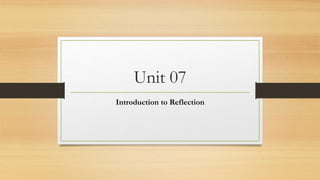
Unit 07.pptx
- 1. Unit 07 Introduction to Reflection
- 2. Students Learning Outcomes After Completion this unit, students will be able to: 1-Meaning of reflection on practice/educational Issues 2- What is the significance of reflection for teacher
- 3. Content 7.1 Meaning of reflection on practice/educational Issues 7.2 Significance of reflection for teacher
- 4. Meaning of Reflection on practice/educational Issues • Reflection is a systematic reviewing process for all teachers which allows you to make links from one experience to the next, making sure your students make maximum progress. Reflection is a basic part of teaching and learning. It aims to make you more aware of your own professional knowledge and action by ‘challenging assumptions of everyday practice and critically evaluating practitioners’ own responses to practice situations’ (Finlay, 2008). The reflective process encourages you to work with others as you can share best practice and draw on others for support. Ultimately, reflection makes sure all students learn more effectively as learning can be tailored to them.
- 5. • “Reflection is the instrument by which experiences are translated into dynamic knowledge” - Korthagen, F. (2001) • “Reflection is a meaning-making process that moves a learner from one’s experience into the next with deeper understanding of its relationships with and connections to other experiences and ideas. • It is a means to essentially moral ends.” • Rodger, C. (2002) Reflection fosters: analytical thinking, appreciation of social and political contexts, development of theories, etc
- 6. • A useful starting point would be the general description of reflection by Boud, Keough and Walker (1985) as “a generic term for those intellectual and affective activities in which individuals engage to explore their experiences in order to lead to a new understanding and appreciation” (p. 19). In short, reflection is about grappling with our past experiences in order to address our future ones. Within these broad parameters, various traditions and schools of thought differ in terms of what reflective processes should be like and what reflection should lead to.
- 7. The process of reflection is a cycle which needs to be repeated • Teach • Self-assess the effect your teaching has had on learning • Consider new ways of teaching which can improve the quality of learning • Try these ideas in practice • Repeat the process Reflective practice is ‘learning through and from experience towards gaining new insights of self and practice’ (Finlay, 2008).
- 9. • Experience • Reflection • Learning • It is about learning from experience, and developing your own thoughts from the experiences. • While it is a natural process we often take unconsciously, we also try to facilitate reflection consciously, both in ourselves in others, by asking questions
- 10. • Is it strange to see RP as a reflection process? • Restorative Questions (for the person whose behavior caused the problem) o What happened? o What were you thinking about at the time? o What have you thought about since? o Who has been affected by what you have done? In what way? o What do you think you need to do to make things right
- 11. The advantages of Reflective Practice • Reflective practice provides a means for teachers to improve their practice to effectively meet the learning needs of their students. Brookfield succinctly describes the advantages of reflective practice to teachers as: • It helps teachers to take informed actions that can be justified and explained to others and that can be used to guide further action. • It allows teachers to adjust and respond to issues. • It helps teachers to become aware of their underlying beliefs and assumptions about learning and teaching.
- 12. • It helps teachers promote a positive learning environment. • It allows teachers to consciously develop a repertoire of relevant and context specific strategies and techniques. • It helps teachers locate their teaching in the broader institutional, social and political context and to appreciate that many factors influence student learning.
- 13. Significance of Reflection for teacher • Reflection is a process of self-examination and self-evaluation in which effective educators regularly engage to improve their professional practices. • The roots of reflective teaching are historically evident in the works of John Dewey (1933, 1938), who maintained that reflection is an important aspect of learning from experience. • Reflective thinking leads educators to act deliberately and intentionally rather than randomly and reactively. Not all
- 14. • Teachers engage in reflective activities. For example, a teacher might refuse to recognize the benefits of reflection or a teacher’s reflection might be informal—a combination of emoting about how she or he felt and thinking about what happened, without learning or progressing from that retrospective point. • When a teacher is involved in active and deliberate reflection and analysis regarding those events that may lead to formulating new strategies for changing behavior in the classroom (Reagan et al., 2000), he or she is using reflection for professional growth.
- 15. • Brookfield (2004) argued that without reflection, teachers run the continual risk of making poor decisions and bad judgments. Without reflection, teachers unquestioningly believe that students can accurately interpret their actions as intended; furthermore, teachers may continue to plan and teach on the basis of unexamined assumptions. • They then fall into the habit of justifying what they do as “common sense.” “Yet unexamined common sense is a notoriously unreliable guide to action” (p. 4). Reflection itself is not, by definition, critical. • For example, one might focus solely on the nuts and bolts of the classroom process, such as timing of coffee breaks or how rigidly she or he wants to stick to homework deadlines for the students. These can be reflections, though not necessarily critical reflections